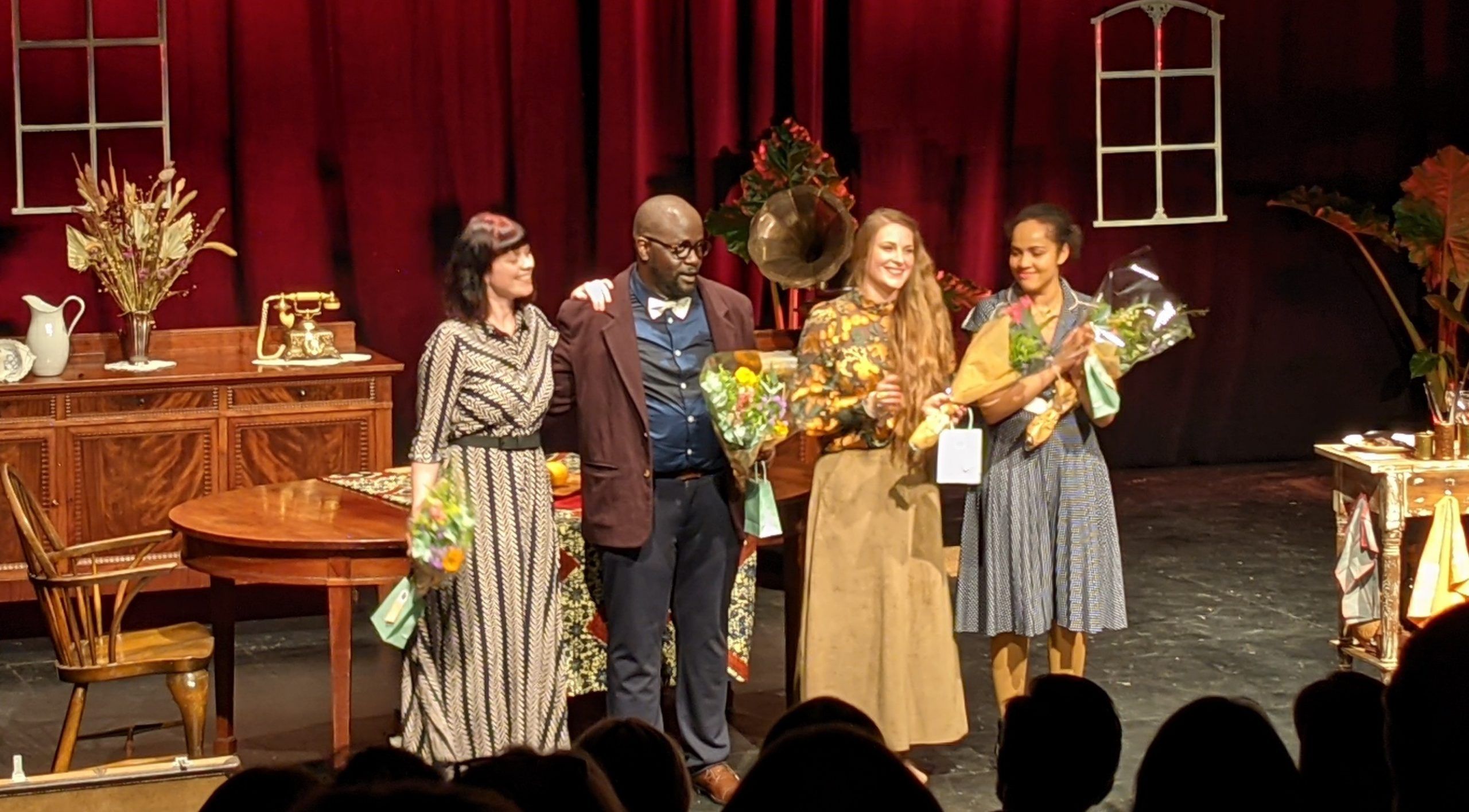Deranged chairs litter the parlour room. They seem to have crash-landed in the orbit of a large dining table bristling with empty bottles and wine glasses.
The lady of the house, Countess Alice de Janzé, and Lord Errol’s butler Jean stand, panting with rage like lions amongst the chaos, glaring at one another from across the table.
The erotic to-and-fro and blazing argument is at the centre of playwright Michael Omoke’s racially-charged reinterpretation of August Strindberg’s ‘Miss Julie’.
Omoke pitches white-settler Alice’s maniacal downward spiral against black-butler Jean’s furious strive to “pull [himself] up”. Their opposing direction of travel embodies the tenet of the play.
Out of Africa
In Omoke’s reimagining, Strindberg’s timeless 19th century reflection on class and gender divide is relocated to the Happy Valley Set – a small group of hedonistic aristocrats who lived in the White Highlands of colonial Kenya between the 1920s and 40s.
Amplified by race, racism and colonial history, this turns the original tension between privilege and servitude up to eleven. Omoke asks: what happens when social, behavioural and racial codes are broken? How do we respond in the structural void that follows?
His reworked script takes no prisoners, touching additionally on male dominance, female solidarity and notions of religious forgiveness. In other words: he went there.
Challenging, uncomfortable, important
“It touches on some very difficult emotions,” agrees Pernille Johansson, who plays Alice de Janzé. She’s variously sultry, imperious, convincingly psychotic and snivellingly pathetic as the countess – deftly commanding an impressive spectrum of human emotions.
Her roared orders to Jean – “Stand up native when I talk to you!” and the even more overt “OBEY ME” – are skin-crawlingly uncomfortable to watch. Even more so when she later begs of him “give me some orders and I’ll obey like a dog.”
But Omoke goes further than simply spiking class tension with racial elements – he directly tackles notions of black identity throughout.
When Christine – Jean’s girlfriend and the countess’s maid – contends his French-British identity with the question “What’s wrong with just being an African?”, he fires back: “Am I supposed to embody a whole continent? You call yourself an African-American. When will you start being just you?”
“Once you’re uncomfortable you know there’s a conversation. That it was uncomfortable was the point,” says Rebecca Langley – who completes the cast of three as Christine.
She is the moral context of the play. Christine is sensitive to injustice, religiously pious, bold and vocal, yet acutely aware of social boundaries. Langley’s well-executed stoicism acts as a canvas against which Jean and Alice’s colourful arc unfolds.
Omoke’s words: loaded guns or empty chambers?
It’s to her that Alice directs one of her final crazed appeals. “You’re a woman … and my friend,” she pleads, to no avail. Which codes mean most? Is sisterhood more powerful than race or class? The words are as empty as the wine glasses on the table.
A huge source of power in Omoke’s script is the contrast of empty vs loaded words. Some words move from having weight to having none – depending on the speaker.
It’s an important consideration in an age when thorny cross-cultural dialogues are globally broadcast via podcasts, videos, Twitter confrontations, viral videos, panel discussions et al. That’s where theatre and visual art is a catalyst for change. “It’s so important for art to provide a safe space for those dialogues,” says Omoke.
“We are still demanding change,” says Langley on why Strindberg’s work keeps being reimagined. “It’s as relevant as it’s ever been – especially with the racial aspects that Michael brings in.”
Poking bruises, waking lions
It’s not the first time ‘Miss Julie’ has been refracted through a colonial lens. In 2017, Yaël Farber’s ‘Mies Julie’ confronted complex issues of land ownership with a version based in South Africa on Freedom Day, a decade after apartheid’s end.
Earlier this year, playwright Amy Ng presented an adaptation that grappled with race and imperial exploitation by transplanting Miss Julie to Hong Kong in 1948. All three interrogate who owes who what according to various social codes, whether its reparations, service, respect or mercy.
But Omoke is going one further, touring Miss Julie’s Happy Valley first to Finland, then to Kenya – the home-ground of the story – where it will likely prove even more impactful. “I’m a bit scared though,” jokes Omoke, well aware of the proverbial lions he is waking.
If the reception in Copenhagen is anything to go by, ‘Miss Julie’s Happy Valley’ will resonate deeply on several contemporary levels. Omoke is poking bruises. Strindberg’s musing on class may cut deep but Omoke’s spin is sharper and braver: he has honed it to a razor’s edge.















